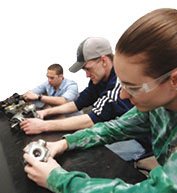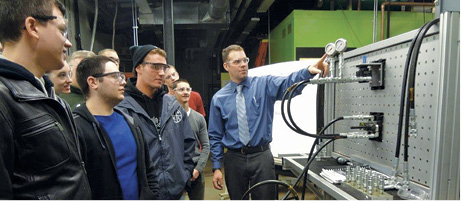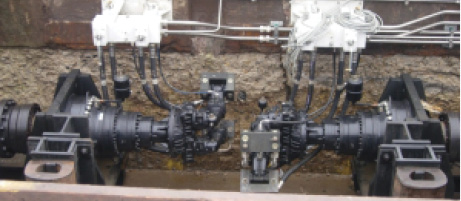Establishing a Fluid Power Program at Alfred State College
A Case Study of IFPS Certification in Post-Secondary Education
Alfred State College is a state university of New York College of Technology located in the southeast corner of the state. Instruction in the field of fluid power has always been part of the two-year and four-year Mechanical Engineering Technology (MET) programs, but in 2010, the MET department made fluid power an area of focus in the program with a dedicated course called Fluid Power Systems Design. The three-credit-hour course is offered in the final year of the four-year program and culminates in an opportunity for students to participate in an onsite offering of the Hydraulic Specialist certification exam offered by the International Fluid Power Society (IFPS).
According to Ed Tezak, SUNY distinguished professor and department chair, “Preparing students to successfully obtain industry certification is a school-wide initiative in our technology programs, and adding this course and content to our curriculum has satisfied that goal, as well as given our graduates an opportunity to further distinguish themselves among engineering and engineering technology graduates in the job market.”
In the first three semesters the course was offered, 50 students have taken the course and 45 have opted to sit for the Hydraulic Specialist exam. The results have been very positive, and there are many examples of how IFPS certification is making an early impact in the students’ careers.
 Chris Dalton, a Hydraulic Specialist and graduate of the MET program, is now a commissioning engineer for a Fortune 300 industrial supply company. “The fluid power class and having the IFPS certification have made a huge difference in my career. I was hired right out of school and now have the ability to approve oil and seal gas systems for our new turbine designs. When I first received the certification, I was unsure what it would do for me, but please tell the next class that it could come in VERY handy to them upon starting their careers. I have used knowledge from that class in Mexico, Germany, and France, as well as a few places in the U.S. Each job had many systems and components that were very similar to the ones that were worked on in lab.”
Chris Dalton, a Hydraulic Specialist and graduate of the MET program, is now a commissioning engineer for a Fortune 300 industrial supply company. “The fluid power class and having the IFPS certification have made a huge difference in my career. I was hired right out of school and now have the ability to approve oil and seal gas systems for our new turbine designs. When I first received the certification, I was unsure what it would do for me, but please tell the next class that it could come in VERY handy to them upon starting their careers. I have used knowledge from that class in Mexico, Germany, and France, as well as a few places in the U.S. Each job had many systems and components that were very similar to the ones that were worked on in lab.”
Similarly, Mike Marsigliano noted the following after landing a job in the mining industry right after graduation: “The fluid power systems class and ability to get the certification while still in school solidified my position. They were looking for a hydraulics engineer with the certification as a plus.”
The MET program at Alfred State is ABET accredited, and making curriculum changes to an accredited engineering technology program is not a simple process. Alfred State, however, had several factors working in its favor. According to Professor Lawrence, “We are fortunate to have a culture within our department that makes every attempt to align our program offerings—not only the accreditation content requirements of ABET, but also individual areas of expertise. Fluid power is a program outcome specifically identified for mechanical engineering technology by ABET, and I have professional experience in the fluid power industry. Adding this course to our four-year degree was a win-win scenario for the school, program, students, and potential employers.”
“There are many degrees in the marketplace, and Alfred State’s forte is creating programs that enable graduates to be well prepared and work ready,” said John Williams, dean of the School of Architecture, Management, and Engineering Technology. “The MET program is validating their students’ education through valuable industry certifications that set them apart and providing employers with capable and competent engineers. With a certification opportunity incorporated in the program, our tag line of ‘Hit the ground running’ has real meaning for our graduates.”
By Matthew Lawrence, CFPHS, Associate Professor, Alfred State College. Matthew Lawrence teaches the Fluid Power Systems Design course. For more information, visit www.alfredstate.edu.








